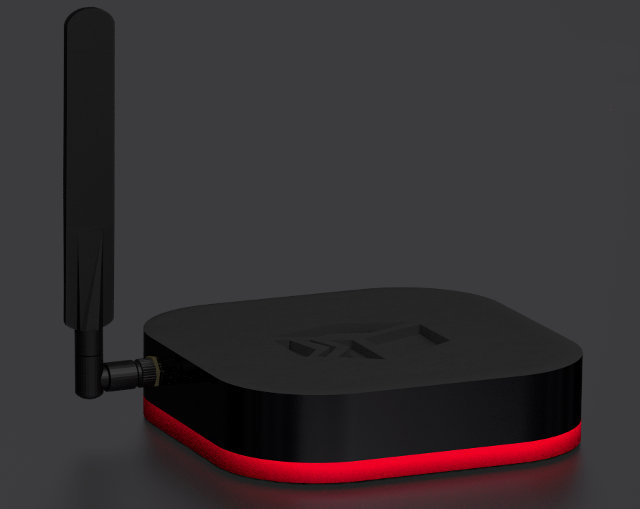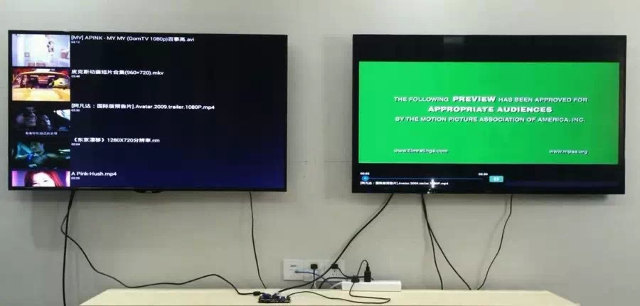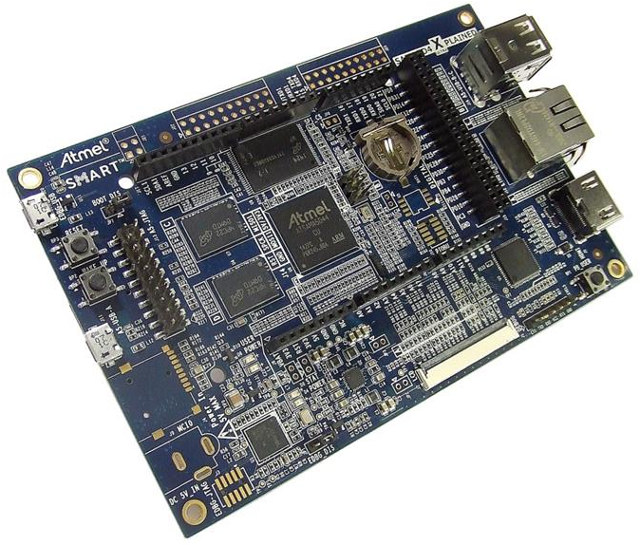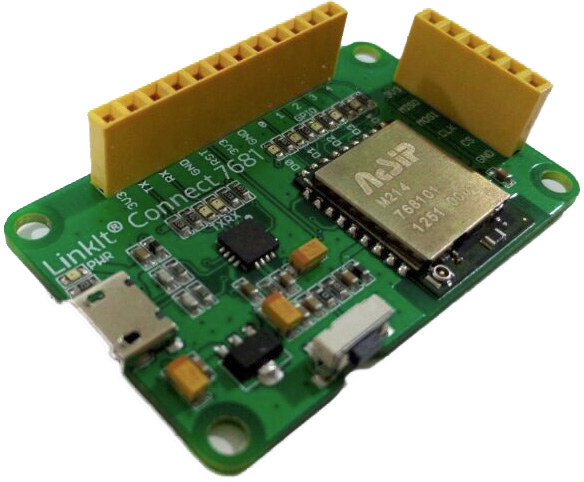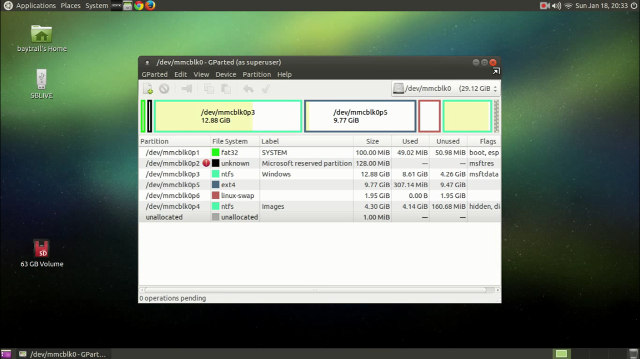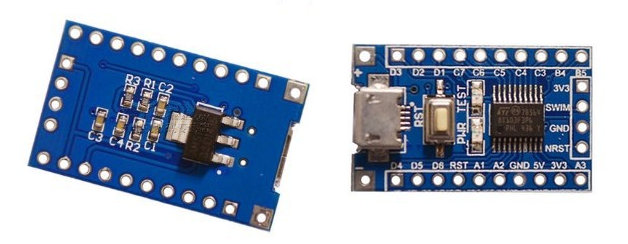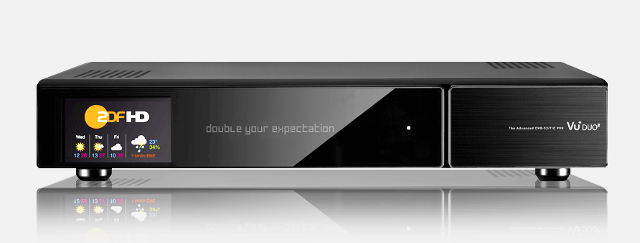Most full sized TV box comes with both Ethernet and Wi-Fi connectivity, but if you live in remote area internet may not be easily available, except possibly via 3G or LTE. There are several ways to handle that. You could connect a 3G USB dongle to your box, but this assume the firmware on your box supports it, or you could gt one cheap of these cheap routers with a USB port, plug the 3G dongle into it, and connect your media player to the router via Wi-Fi or Ethernet. If you’d rather have a single device with an easier setup, MediaBox MBX-3G could be an interesting option. MediaBox MBX-3G specifications: SoC – Quad core ARM Cortex A9 @ 1.6Ghz with quad core GPU (This looks like Rockchip RK3188) System Memory – 2GB DDR3 Storage – 8 eMMC flash + microSD slot (up to 32GB) Video & Audio Output – […]
Independent Dual Display Support on Firefly-RK3288 Development Board (Video)
From time to time, I’m being asked which platform can support dual independent displays, and although I noticed Mele A1000 (Allwinner A10) did support dual displays in Linux, I never really investigated how well it handles it, so I normally recommend to have a look at x86 platforms with AMD or Intel processor that specifically claim support for dual independent display. But today, I’ve noticed a developer working for T-Chip posted a nice demo on T-Firefly forums with two displays connected via HDMI and VGA. The demo shows Firefly-RK3288 development board running Android with two displays in three configurations: Display Mirroring – The same content is shown on both display. Especially useful for digital signage application, where one board can drive two displays with the same content Extended Desktop – The user interface is extended on both monitors. It’s like having a single large monitor with a 32:9 aspect ratio […]
Atmel SAMA5D4 Xplained Ultra Development Board Adds HDMI, 720p Video Decoding
Atmel has introduced an upgrade to their Atmel SAMA5D3 Xplained development board with SAMA5D4 Xplained Ultra replacing SAMA5D36 by SAMA5D44 embedded micro-processor for 720p hardware video decoding support, and adding HDMI output, extra storage and memory, etc… but losing one Ethernet port. Atmel SAMA5D4 Xplained Ultra (XLUT) specifications: MPU – Atmel SAMA5D44 Cortex-A5 Microprocessor @ 536 MHz System Memory – 2x 2Gbit DDR2 memory Storage – 4 Gbit NAND Flash, 1x 4-bit SD card connector (not populated), 1x 4-bit micro SD connector, optional serial EEPROM (SPI), one EEPROM with MAC address and serial number. Connectivity – 1x Ethernet 10/100M Display – 1x LCD interface connector, 1x HDMI port USB – 1x micro USB device connector, 2x USB host connectors Debugging – 1x 20-pin J-TAG connector, 1x EDBG connector (not populated), 1x serial DBGU interface (3.3V) Expansion – Arduino R3-compatible headers, XPRO set of connectors; ADC inputs and CAN interfaces Misc […]
LinkIt Connect 7681 is a Wi-Fi IoT Board Powered by Mediatek MT7681
So it looks like Mediatek has decided to carry on with its Mediatek Labs endeavours, as after launching LinkIt ONE last year, they’re about to introduce LinkIT Connect 7681, a development board with a Mediatek MT7681 based Wi-Fi module, and access to various GPIOs. LinkIt Connect 7681 HDK (Hardware Development Kit) specifications: SoC – Mediatek MT7681 Andes N9 processor @ 80 MHz with 64KB RAM, Storage – 1MB SPI Flash for firmware Connectivity – Wi-Fi: 802.11 b/g/n for Station mode; 802.11 b/g for AP mode via a MT7681 module by AcSIP Headers – 12-pin header for UART, 5 GPIOs (also usable as software PWM), RESET, and 3.3V/5V/GND; 6-pin header for SPI, 3.3V and GND. USB – 1x micro USB for power and programming/debugging Misc – Reset push-button, 2x UART LEDs Power Supply – On-board 1A 3.3V voltage regulator (can be powered from USB connector) I/O Voltage – 3.3V for GPIO […]
Install Ubuntu 14.10 on MeegoPad T01 with a Live ISO Image
MeegoPad T01 has recently been shown to boot Ubuntu and Android, but no installation disk had been provided so far. But thanks to deadhp1, there’s now a “beta” Ubuntu 14.10 image with MATE desktop environment available for download in order to try or install Ubuntu on MeegoPad T01, and other Intel Atom Bay Trail-T devices. Before you decide to try or install the image, be aware that audio and Bluetooth are not working for now, but everything else should work, including hardware video decoding in Kodi. If your device is not using a Realtek rtl8723bs module, Wi-Fi won’t work, and you may need to use a USB Ethernet dongle to get IP connectivity. The instructions will keep your Windows 8.1 installation too, albeit I suppose you could also wipe out the Windows 8.1 partition completely and run Ubuntu only on the device. If the instructions are not followed carefully, you […]
Meet STMicro STM8S Based One Dollar Development Board
ESP8266 modules are $3 Wi-Fi boards targeting IoT applications that can be used in standalone mode, or connected to another MCU based board. But what if you don’t actually need Wi-Fi, but instead require a tiny board to control a few GPIOs? Arduino Pro mini can be used for this, but it costs about $10 on Sparkfun, and it’s certainly cheap enough for most projects. Switching to Aliexpress, you can get Arduino Pro mini clones for about $2, and a bit less in 10 pieces quantities. But you can get even cheaper and add a micro USB port with STMicro STM8S based boards that can be found for 5.5 CNY (Less than $1) on Taobao.com, or – once oversea shipping is factored in – about $1.60 to $1.70 on BuyInCoins, or Aliexpress without headers, and the version with headers sells for about $2 or more. Let’s check the board specifications: […]
Linux based Vu+ DVB Set-top Boxes Now Support XBMC/Kodi
Vu+ Duo2, Solo2 and Solo SE are high-end Linux based DVB receivers powered by Broadcom processors made by Ceru, and with a relatively active community of users and developers. All three models have recently received support for XBMC in their “Black Hole” firmware. Solo SE is the most recent model having been released in 2014, against Duo2 and Solo2 that have been selling since 2012 according to Wikipedia. Since I’ve never heard about these, I’ll check out Duo2, as it comes with the most features out of the three. Vu+ Duo2 specifications: SoC – Broadcom BCM7424 dual core MIPS processor @ 1.3 GHz with VideoCore IV GPU System Memory – 2GB RAM Storage – 1 GB NAND flash + SATA III interface for 2.5″ and 3.5″ HDD (internal) + eSATA + Video Output – HDMI, SCART, Composite, and Component (YPbPr) Audio Output – HDMI, stereo audio, and optical S/PDIF Tuners – […]
Mini Review of VidOn Box Android Media Player
Vidon Box is an Allwinner A31s based TV box made by Vidon.me, a Diamond sponsor for Kodi entertainment center. I’ve already listed specs, subscriber services, and uploaded pictures in the unboxing post, so it’s time for a review. Since Allwinner A31s has been around for a while, I’ve decided to write a shorter review. First Boot, Setup, and First Impressions Since the box provides some services with a subscription, with a free 1-year top-up card included, you’ll probably want to register an account on Vidon.me first, as it’s needed to activate all services in the box as shown on the back of the top-up card. After the optional Subscription is $14.99 per year, and it’s only needed if you need features like Blu-ray navigation, or audio pass-through. The simple remote included does the job if you only use the box for settings and XBMC, but otherwise you’ll need an air […]


